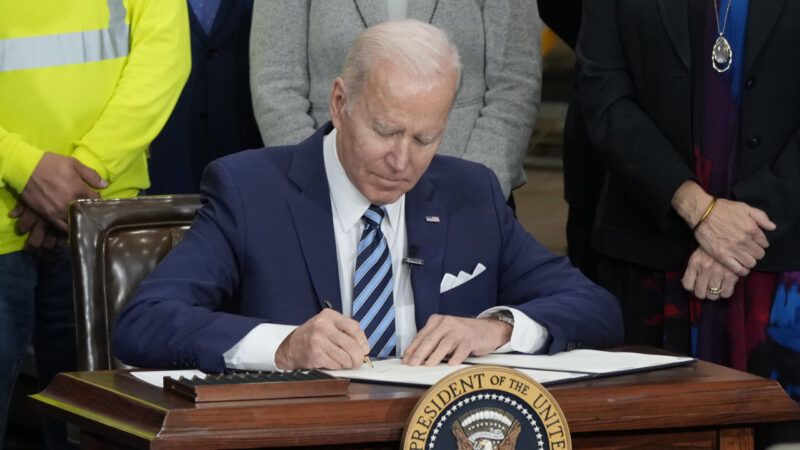Progressive Lawmakers Ask Joe Biden To Do Their Jobs for Them With Executive Orders
Someone might want to remind them that Democrats have a majority in both congressional chambers.

From banning gas and oil drilling on federal lands to fixing problems with the Affordable Care Act and overhauling the immigration system, a group of congressional Democrats is pushing the Biden administration to take executive action on a host of issues that Congress apparently can't or won't deal with.
Someone might want to remind them that Democrats have a majority in both chambers.
But why go through the effort to pass legislation when you can have a president do it with the mere stroke of a pen? That's the energy emanating from the seven-page "Recommendations for Executive Action" memo published last week by the Congressional Progressive Caucus, a coalition of about 100 left-wing lawmakers.
These lawmakers should note, though, that executive actions can be easily undone by the next Republican president, so any policy wins achieved this way will be fleeting at best and serve only to expand the bloated powers of the executive branch.
Among other things, progressives are asking the White House to declare "a National Climate Emergency" to unlock even more presidential authority over any aspect of the economy that is judged to be contributing to global warming. The progressives' memo urges the Biden administration to unilaterally cancel subsidies for fossil fuels, cut off all federal loans and grant programs to fossil fuel projects and infrastructure, implement a new drilling ban on federal land, and "invoke authorities under the Defense Production Act and Trade Expansion Act" to promote green energy projects and ban imported oil.
The specific calls for President Joe Biden to use the Defense Production Act and Trade Expansion Act are noteworthy because former President Donald Trump invoked both during his time in office to significantly expand executive authority over the domestic economy and international trade. At the time, some warned that Trump's use of those laws to achieve Republicans' politically motivated ends would offer an easy road map for Democrats to follow when they retook the White House.
Peter Harrell, then a trade policy expert for the Center for a New American Security (and now a member of the White House's National Security Council) made the link explicit in a 2020 essay for Foreign Policy. "Fortunately for supporters of aggressive curbs on global emissions, President Donald Trump has demonstrated a highly effective way to circumvent the legislative process," he wrote. "His use of national security laws to impose tariffs and sanctions sets a precedent for a future Democratic president to address climate change even if Congress fails to act."
This is how it always goes. One party sets a new precedent for executive power, and the other party rushes to take advantage as soon as possible. Rinse, repeat.
The progressives' wishlist for the Biden administration also includes price controls for drugs like insulin and naloxone, the cancellation of all federal student debt, and the creation of a federal Office of Gun Violence Prevention to impose more restrictions on Americans' Second Amendment rights.
It's not all expensive, unworkable, big government stuff. There's a whole section urging the Biden administration to accept more refugees from places like El Salvador, Hong Kong, and Yemen, and to liberalize immigration laws in general. Other portions call for executive orders to increase transparency in America's police departments and in government contracting.
But the relative merits or drawbacks of any of these proposals are somewhat beside the point. Every member of the progressive caucus in Congress is, by definition, a member of Congress capable of writing and introducing legislation. If these lawmakers want to see changes to existing laws like the Affordable Care Act or want to create more laws to limit gas drilling, abolish student loans, or change the immigration system, they should work with their colleagues to pass those pieces of legislation.
The executive branch does not exist so ideas that cannot get the requisite votes in Congress can become national policy anyway. This is exactly backward. Presidents are supposed to take their agendas before Congress to get approval or denial by the representatives of the American people. Isn't that the whole point of the State of the Union dog and pony show we had to sit through last month?
"It's a sad commentary on our current Congress that its members would invite and even urge the executive branch to arrogate legislative power to itself," writes David Boaz, executive vice president of the libertarian Cato Institute. Boaz notes that Trump accused [former President Barack] Obama of taking "the easy way out" and promised to do away with executive orders—only to then issue 220 executive orders in four years compared to 276 issued by Obama over eight years. Biden, despite frequently talking about the necessity of political consensus, has already issued 85 executive orders, putting him roughly on pace to match or exceed Trump's one-term output.
This is no way for a small-r republican government to function. It's also no way for a progressive faction to achieve lasting policy wins, since any executive order can be simply undone by the next Republican president—many of those Trump executive orders were reversing Obama ones, ditto for Biden versus Trump.
This is not, as Rolling Stone magazine called it, a "plan to save the Democratic Party from itself." It is nearly 100 of the mere 435 people privileged enough to be federal lawmakers saying out loud that they believe themselves to be obsolete. If they want to advocate for executive action, these progressives should resign from Congress, become lobbyists, and let people who want to be legislators do the job.
